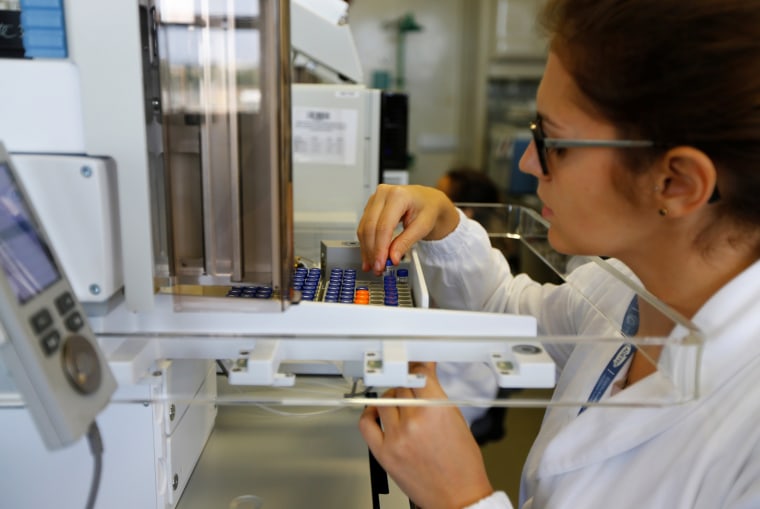Brazil's top anti-doping scientist has a stern yet ambitious warning for any Olympic athlete planning to cheat during this summer's Games: You probably won't get away with it.
"We'll have the best doping technology, so the clean athletes are assured they will have fair play," Professor Francisco Radler de Aquino Neto, head of the Brazilian Doping Control Laboratory, told NBC News during a recent visit to his lab. "The ones that will maybe think of cheating the system, they should be aware that they will probably be caught."
Neto gave the tour just days before the latest series of bombshells rocked the already embattled efforts by anti-doping officials.
On Thursday, the former head of Russia's drug-testing laboratory told the New York Times about what he said was a widespread culture of doping by his country during the 2014 Sochi Winter Olympics.
In his explosive remarks, Grigory Rodchenkov went even further than a report in November by the World Anti-Doping Agency, known as WADA, which accused Russia of covering up a state-sponsored doping program.
Russia was provisionally suspended from track-and-field events following that publication, and it remains to be seen whether they will be allowed to compete at Rio.
The Times' story was not verified by NBC News, and Kremlin spokesman Dmitry Peskov called it "utterly groundless" and "a turncoat's slander," according to Russian news agency RIA Novosti.
However, Russia's sports minister minister Vitaly Mutko apologized on Sunday, writing in The Sunday Times that the nation was "ashamed" and pleading for Russia's track and field athletes to be allowed to compete in Rio.
Mutko did not admit to the state sponsoring of any doping program, but called out "serious mistakes" at the All-Russia Athletic Federation.
"We are very sorry that athletes who tried to deceive us, and the world, were not caught sooner. We are very sorry because Russia is committed to upholding the highest standards in sport," he wrote.
"Let us be clear: we are ashamed."
WADA said in a separate report Thursday that independent testing in Russia had decreased by more than two-thirds in the past year, according to The Associated Press.
The organization also suspended Kenya's anti-doping agency, saying a new law passed there to try to combat performance-enhancing drugs was "a complete mess," the AP reported.
Neto said his team in Brazil "has learned a lot" from the allegations made by WADA against Russia in November.
Brazilian anti-doping officials "have already scrutinized the whole document and they are applying everything that they can to avoid something like that happening in Brazil," he said.
Just like the 10,000-plus athletes traveling to Rio this summer, Neto said his team has also been in training. The unit has overcome hurdles, having lost its World Anti-Doping Agency accreditation in 2013 and only recouping it again last May.
It hit problems again in November when it was added to WADA's "watch list" after the facility was found not to comply with the World Anti-Doping Code. WADA said in March that the facility, along with five others, had "all resolved their code-related issues."
Now, with his modern building and state-of-the-art equipment — thanks to a big investment from the Brazilian government — Neto said "everything is in place" for the Games.
The lab is ready to handle up to 450 samples a day, Neto said, but he expects the average to be between 150-250 on each of the 19 days of competition. Along with Rio staff, more than 100 specialists from other WADA-accredited labs will be on-hand to assist.
The facility will be responsible for all testing inside the International Olympic Committee's official period of July 24-August 21 and will operate around the clock, delivering results in as little as 24 hours.
During the London 2012 Summer Games, the IOC reports 5,051 tests were done, up from 4,770 during Beijing's 2008 Summer Games. And testing on samples taken for those Games is still happening.
Related: Deadly Cops Join Long List of Rio Olympics Roadblocks
In 2015, the IOC extended the statute of limitations for retesting of athlete samples to ten years. Scientists are taking another look at samples from Beijing and London.
Examining the samples again lets scientists check for substances that were previously unknown or could not be detected at the time. That includes new tools in the testing arsenal such as checks for gene doping, which Neto said would be a "step forward" in deterring doping abuse.
With the grave allegations directed at Russia ringing in the ears of sports fans, Brazil's top anti-doping official is keen to assure the public that at the very least the country's own sportsmen and women will compete uncontaminated.
"There's an enormous effort by the Brazilian government to test every athlete so we will have at least the Brazilian athletes very clean for the Games," he said.
